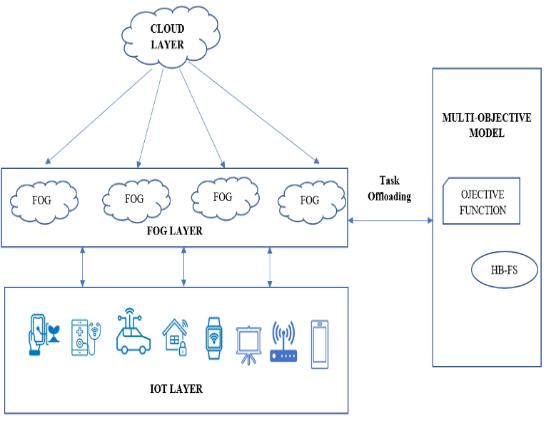Dynamic Offloading Technique for Latency-Sensitive Internet of Things Applications using Fog Computing
Main Article Content
Abstract
Internet of Things (IoT) has evolved as a novel paradigm that provides com-putation power to different entities connected to it. IoT offers services to multiple sectors such as home automation, industrial automation, traffic management, healthcare sector, agriculture industry etc. IoT generally relies on cloud data centers for extended analytics, processing and storage support. The cloud offers highly scalable and robust platform for IoT applications. But latency sensitive IoT applications suffer delay issues as the cloud lies in remote location. Edge/fog computing was introduced to overcome the issues faced by delay-sensitive IoT applications. These platforms lie close to the IoT network, reducing the delay and response time. The fog nodes are usually distributed in nature. The data has to be properly offloaded to available fog nodes using efficient strategies to gain benefit from the integration. Differ-ent offloading schemes are available in the literature to overcome this prob-lem This paper proposes a novel offloading approach by combining two effi-cient metaheuristic algorithms, Honey Badger Algorithm (HBA) and Fla-mingo Search Algorithm (FSA) termed as HB-FS algorithm. The HB-FS is executed in an iterative manner optimizing the objective function in each it-eration. The performance evaluation of the proposed approach is done with different existing metaheuristic algorithms and the evaluations show that the proposed work outperforms the existing algorithms in terms of latency, response time and execution time. The methodology also offers better degree of imbalance with proper load balancing under different conditions.
Article Details
References
Z. Qu, Y. Wang, L. Sun, D. Peng, and Z. Li, “Study QoS optimization and energy saving techniques in cloud, Fog, EDge, and IoT,” Complexity, vol. 2020, 2020, doi: 10.1155/2020/8964165.
S. Aljanabi and A. Chalechale, “Improving IoT Services Using a Hybrid Fog-Cloud Offloading,” IEEE Access, vol. 9, pp. 13775–13788, 2021, doi: 10.1109/ACCESS.2021.3052458.
F. A. Hashim, E. H. Houssein, K. Hussain, M. S. Mabrouk, and W. Al-Atabany, “Honey Badger Algorithm: New metaheuristic algorithm for solving optimization problems,” Math. Comput. Simul., vol. 192, pp. 84–110, 2022, doi: 10.1016/j.matcom.2021.08.013.
“Flamingo Search Algorithm: A New Swarm Intelligence Optimization Algorithm | Enhanced Reader.” .
A. M. Nassef, E. H. Houssein, B. E. din Helmy, and H. Rezk, “Modified honey badger algorithm based global MPPT for triple-junction solar photovoltaic system under partial shading condition and global optimization,” Energy, vol. 254, p. 124363, Sep. 2022, doi: 10.1016/J.ENERGY.2022.124363.
M. Yu, A. Liu, N. N. Xiong, and T. Wang, “An Intelligent Game-Based Offloading Scheme for Maximizing Benefits of IoT-Edge-Cloud Ecosystems,” IEEE Internet Things J., vol. 9, no. 8, pp. 5600–5616, 2022, doi: 10.1109/JIOT.2020.3039828.
R. O. Aburukba, M. AliKarrar, T. Landolsi, and K. El-Fakih, “Scheduling Internet of Things requests to minimize latency in hybrid Fog–Cloud computing,” Futur. Gener. Comput. Syst., vol. 111, pp. 539–551, 2020, doi: 10.1016/j.future.2019.09.039.
J. Y. Baek, G. Kaddoum, S. Garg, K. Kaur, and V. Gravel, “Managing Fog Networks using Reinforcement Learning Based Load Balancing Algorithm,” IEEE Wirel. Commun. Netw. Conf. WCNC, vol. 2019-April, pp. 1–7, 2019, doi: 10.1109/WCNC.2019.8885745.
A. A. Alli and M. M. Alam, “SecOFF-FCIoT: Machine learning based secure offloading in Fog-Cloud of things for smart city applications,” Internet of Things, vol. 7, no. 2019, p. 100070, 2019, doi: 10.1016/j.iot.2019.100070.
M. Abbasi, E. Mohammadi Pasand, and M. R. Khosravi, “Workload Allocation in IoT-Fog-Cloud Architecture Using a Multi-Objective Genetic Algorithm,” J. Grid Comput., vol. 18, no. 1, pp. 43–56, 2020, doi: 10.1007/s10723-020-09507-1.
M. I. Bala and M. A. Chishti, “Offloading in cloud and fog hybrid infrastructure using iFogSim,” Proc. Conflu. 2020 - 10th Int. Conf. Cloud Comput. Data Sci. Eng., pp. 421–426, 2020, doi: 10.1109/Confluence47617.2020.9057799.
X. Liu, J. Yu, Z. Feng, and Y. Gao, “Multi-agent reinforcement learning for resource allocation in IoT networks with edge computing,” China Commun., vol. 17, no. 9, pp. 220–236, 2020, doi: 10.23919/JCC.2020.09.017.
V. Meena, M. Gorripatti, and T. Suriya Praba, “Trust Enforced Computational Offloading for Health Care Applications in Fog Computing,” Wirel. Pers. Commun., vol. 119, no. 2, pp. 1369–1386, 2021, doi: 10.1007/s11277-021-08285-7.
M. Keshavarznejad, M. H. Rezvani, and S. Adabi, “Delay-aware optimization of energy consumption for task offloading in fog environments using metaheuristic algorithms,” Cluster Comput., vol. 24, no. 3, pp. 1825–1853, 2021, doi: 10.1007/s10586-020-03230-y.
A. Kishor and C. Chakarbarty, “Task Offloading in Fog Computing for Using Smart Ant Colony Optimization,” Wirel. Pers. Commun., no. 0123456789, 2021, doi: 10.1007/s11277-021-08714-7.
P. Kaur and S. Mehta, “Improvement of Task Offloading for Latency Sensitive Tasks in Fog Environment,” Lect. Notes Data Eng. Commun. Technol., vol. 74, pp. 49–63, 2022, doi: 10.1007/978-981-16-3448-2_3.
A. Robles-Enciso and A. F. Skarmeta, “A multi-layer guided reinforcement learning-based tasks offloading in edge computing,” Comput. Networks, vol. 220, no. September 2022, p. 109476, 2023, doi: 10.1016/j.comnet.2022.109476.
Yakubu, I.Z., Murali, M. An efficient meta-heuristic resource allocation with load balancing in IoT-Fog-cloud computing environment. J Ambient Intell Human Comput (2023). https://doi.org/10.1007/s12652-023-04544-6
S. Bitam, S. Zeadally, and A. Mellouk, “Fog computing job scheduling optimization based on bees swarm,” Enterp. Inf. Syst., vol. 12, no. 4, pp. 373–397, 2018, doi: 10.1080/17517575.2017.1304579.
A. Al-Maamari and F. A. Omara, “Task scheduling using PSO algorithm in cloud computing environments,” Int. J. Grid Distrib. Comput., vol. 8, no. 5, pp. 245–256, 2015, doi: 10.14257/ijgdc.2015.8.5.24.

